Related Research Articles

George Stephenson was an English civil engineer and mechanical engineer during the Industrial Revolution. Renowned as the "Father of Railways", Stephenson was considered by the Victorians as a great example of diligent application and thirst for improvement. His chosen rail gauge, sometimes called "Stephenson gauge", was the basis for the 4-foot-8+1⁄2-inch (1.435 m) standard gauge used by most of the world's railways.

Coalbrookdale is a town in the Ironbridge Gorge and the Telford and Wrekin borough of Shropshire, England, containing a settlement of great significance in the history of iron ore smelting. It lies within the civil parish called the Gorge.
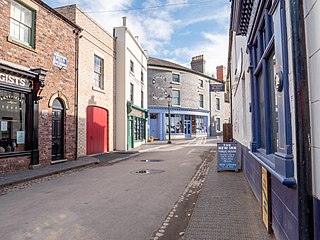
Blists Hill Victorian Town is an open-air museum built on a former industrial complex located in Madeley, Telford and Wrekin, Shropshire, England. The museum attempts to recreate the sights, sounds and smells of a Victorian Shropshire town in the late 19th and early 20th centuries. It is one of ten museums operated by the Ironbridge Gorge Museum Trust.

Sir John Fowler, 1st Baronet, KCMG, LLD, FRSE was an English civil engineer specialising in the construction of railways and railway infrastructure. In the 1850s and 1860s, he was engineer for the world's first underground railway, London's Metropolitan Railway, built by the "cut-and-cover" method under city streets. In the 1880s, he was chief engineer for the Forth Bridge, which opened in 1890. Fowler's was a long and eminent career, spanning most of the 19th century's railway expansion, and he was engineer, adviser or consultant to many British and foreign railway companies and governments. He was the youngest president of the Institution of Civil Engineers, between 1865 and 1867, and his major works represent a lasting legacy of Victorian engineering.
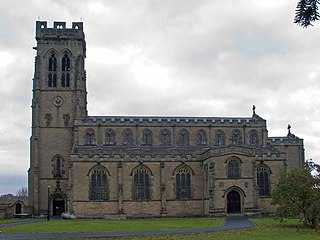
Broseley is a market town in Shropshire, England, with a population of 4,929 at the 2011 Census and an estimate of 5,022 in 2019. The River Severn flows to its north and east. The first iron bridge in the world was built in 1779 across the Severn, linking Broseley with Coalbrookdale and Madeley. This contributed to the early industrial development in the Ironbridge Gorge, which is now part of a World Heritage Site.

Foster, Rastrick and Company was one of the pioneering steam locomotive manufacturing companies of England. It was based in Stourbridge, Worcestershire, now West Midlands. James Foster, an ironmaster, and John Urpeth Rastrick, an engineer, became partners in 1816, forming the company in 1819. Rastrick was one of the judges at the Rainhill Trials in 1829. The company was dissolved on 20 June 1831.

The Telford Steam Railway (TSR) is a heritage railway located at Horsehay, Telford in Shropshire, England, formed in 1976.

James Foster was a prominent Worcestershire ironmaster, coalmaster and senior partner in the important iron company of John Bradley & Co, Stourbridge, which was founded by his elder half-brother but greatly enlarged under his direction. As well as the Stourbridge ironworks, the business owned a number of coal and ironstone mines, furnaces, forges and other works in the Black Country and near Ironbridge. The business continued long after James Foster's death, ultimately being incorporated as John Bradley (Stourbridge) Ltd in the early 20th century. In the late 19th century, the company was a member of the Marked Bar Association, whose members were the makers of the highest quality bar iron of the time. Foster was also a partner in other companies including the engineering firm Foster, Rastrick and Company, which built the first steam locomotive to run on rails in the USA. He was also a banker and landowner as well as being elected Member of Parliament and appointed as Improvement Commissioner for Stourbridge, and High Sheriff of Worcestershire.

Coalport is a village in Shropshire, England. It is located on the River Severn in the Ironbridge Gorge, a mile downstream of Ironbridge. It lies predominantly on the north bank of the river; on the other side is Jackfield. It forms part of the civil parish of the Gorge and is the south-eastern corner of the borough of Telford and Wrekin.
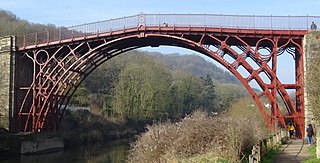
The Iron Bridge is a cast iron arch bridge that crosses the River Severn in Shropshire, England. Opened in 1781, it was the first major bridge in the world to be made of cast iron. Its success inspired the widespread use of cast iron as a structural material, and today the bridge is celebrated as a symbol of the Industrial Revolution.
William Fairbairn and Sons, was an engineering works in Manchester, England.

Jackfield is a village in the Telford and Wrekin borough of Shropshire, England, lying on the south bank of River Severn in the Ironbridge Gorge, downstream from Ironbridge. Like many of the settlements in the area, it is notable for its place in the Industrial Revolution.

The Butterley Company was an English manufacturing firm founded as Benjamin Outram and Company in 1790. Its subsidiaries existed until 2009.
The Park Gate Iron and Steel Company was a British company that smelted iron ore and turned it into rolled steel and semi-finished casting products. Its works was at Parkgate, South Yorkshire on a triangular site bounded on two sides by the main road between Rotherham and Barnsley (A633) and the North Midland Railway main line between Rotherham Masborough and Cudworth. It also operated ironstone quarries in Northamptonshire and Leicestershire.
George Forrester and Company was a British marine engine and locomotive manufacturer at Vauxhall Foundry in Liverpool, established by Scottish engineer George Forrester. The company opened in 1827 as iron founders and commenced building steam locomotives in 1834.

The Port of Barrow refers to the enclosed dock system within the town of Barrow-in-Furness, England. Morecambe Bay is to the east of the port and the Irish Sea surrounds it to the south and west. The port is currently owned and operated by Associated British Ports Holdings, but some land is shared with BAE Systems Submarine Solutions. Currently consisting of four large docks, the Port of Barrow is one of North West England's most important ports. The docks are as follows: Buccleuch Dock, Cavendish Dock, Devonshire Dock and Ramsden Dock. The port of Barrow is the only deep water port between the Mersey and the Clyde.
John Cockerill, formerly Cockerill Maintenance & Ingénierie (CMI), is a mechanical engineering group headquartered in Seraing, Belgium. It produces machinery for steel plants, industrial heat recovery equipment and boilers, as well as shunting locomotives and military equipment.
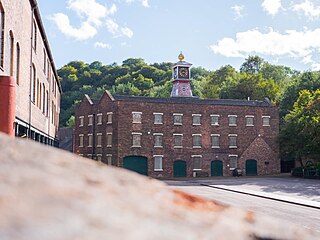
The Coalbrookdale Museum of Iron is one of ten Ironbridge Gorge Museums administered by the Ironbridge Gorge Museum Trust. The museum is based in the town of Coalbrookdale in the Ironbridge Gorge, in Shropshire, England, within a World Heritage Site, the birthplace of the Industrial Revolution.
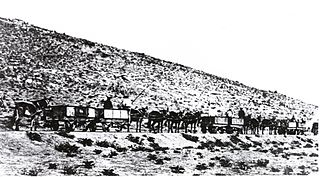
The Namaqualand 0-6-0T of 1871 were two South African steam locomotives from the pre-Union era in the Cape of Good Hope.

The Museum of the Gorge, originally the Severn Warehouse, is one of the ten museums of the Ironbridge Gorge Museum Trust. It portrays the history of the Ironbridge Gorge and the surrounding area of Coalbrookdale, Shropshire, England.
References
- 1 2 "Lilleshall Co" . Retrieved 26 November 2014.
- ↑ Ellis, Hamilton (1968). The pictorial history of railways. Hamlyn. p. 57.
- ↑ "Iron and Steel Corporation of Great Britain, 1946-1967". Modern Records Centre. Retrieved 13 March 2023.
- ↑ Brian, Roger (2005). "Lilleshall Company Railways".
- ↑ "Home". Ironbridge Gorge Museum. Archived from the original on 22 February 2012. Retrieved 26 November 2014.